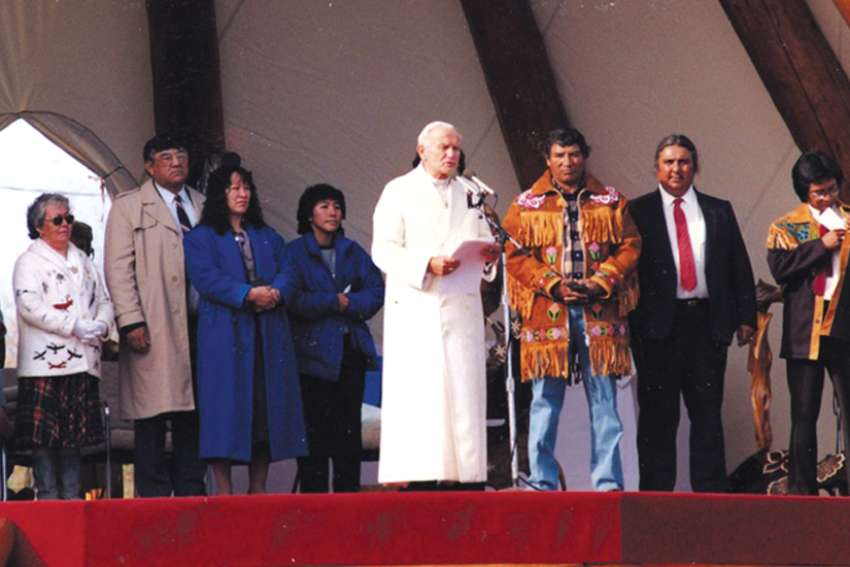The premise of the visit is that if the comprehensive apology offered in 1991 by the Oblates, who ran most of the Catholic schools, is combined with the papal apology offered by Pope Benedict XVI in 2009, but this time in Canada, reconciliation will be advanced.
Perhaps. The Holy Father is certainly generous in deciding to try. The reality is that across the country there is authentic reconciliation and excellent relationships between Indigenous peoples and their local dioceses and parishes. That’s why local Indigenous leaders were the first to condemn the setting aflame of Catholic churches. At the level of national leadership, though, there are conflicting agendas at work. Whether anything Pope Francis can do in Canada will change that remains to be seen. The more urgent task is to figure out what a papal visit would look like. And that will be complicated.
In September, as I wrote in my previous column in these pages, the Canadian bishops committed themselves to raising $30 million over five years for reconciliation projects that will be selected later this month.
It won’t be easy. Part of the reason the first fundraising campaign failed 15 years ago was that it was not clear what the money would do, and whether it was needed. The federal government had spent $4 billion in the initial residential schools settlement. What would an additional $30 million do?
In the last two years, the federal government has committed an additional $600 million to reconciliation projects, and will negotiate in the coming months a multi-billion dollar settlement with Indigenous Canadians in the child welfare system. Again, Catholics may ask what an additional $30 million will accomplish. Matters will be more clear once the projects to be funded are announced.
Nevertheless, hosting a papal visit while attempting to raise money for reconciliation efforts will be daunting. Papal visits are expensive. This most recent fundraising drive is not about the money, but about contrition and goodwill. What then would be the result if the fundraising came up short, as it well might, but at the same time the Church paid significant sums to host a papal visit?
Recall that in 2009, the Vatican meeting of Pope Benedict XVI and Indigenous leaders was hailed as a major milestone, even “closing the book” on the matter of apologies. Six years later the meeting was being discounted and relations has been set back. It cannot be ruled out that a papal visit by Pope Francis might become, in future, a point of contention and conflict as did the efforts of 2009.
If the Catholic Church has money to spend on hosting the Pope but falls a loonie short in the $30-million campaign, there will be significant damage.
The only solution is not to spend a dime more than necessary. Arrange the Indigenous encounter only and no other events. In Canada, any single event added requires more to be added still; if there is an event in English Canada, there must be one in French Canada; if he visits the east, he must also stop in the west. So best just to come for the express purpose of the papal visit, stay a day or two, and depart.
There is no need for extended talks; that will take place in the Vatican this December, where an astonishing four days has been set aside for Pope Francis to meet with Indigenous delegations from Canada. The papal visit will be an important capstone. It will be sufficient for Pope Francis to visit, honour the Indigenous peoples he meets and repeat, for the Canadian context, what he said in Bolivia six years ago on the same subject of Catholic-Indigenous relations.
Pope Francis should visit Fort Simpson, N.W.T., a symbolically rich site. St. John Paul II was scheduled to meet Indigenous peoples there in 1984 but fog prevented his plane from landing. He promised to return. He kept that promise, visiting Canada solely for that purpose for one day in 1987.
The visit was a historic highlight of Catholic-Indigenous relations, and John Paul robustly defended the rights of Indigenous peoples and their need, like all peoples, for the Gospel of Jesus Christ. Both points need to be made today, in addition to the contrition for residential schools.
Fort Simpson is the ideal site. It is a place of respect and reconciliation. It is a place far away from the politics and power struggles of Ottawa. It is a place of promises made and promises kept, when so many promises have been broken.
Ideally, the prime minister would not be present, but the Crown would be represented by Governor General Mary Simon — who incidentally was on the organizing committee of the now-maligned first fundraising campaign. She too made her best efforts at the time.
There have been one-day papal visits to the north before, aside from the Fort Simpson visit. In 1981, St. John Paul II spent less than a day in Anchorage, Alaska, on his return from an Asian trip to Pakistan, the Philippines, Guam and Japan. In 1984, he made another one-day visit to Fairbanks, Alaska, this time on his way to Korea.
Thus there is ample precedent for Pope Francis to stop in Fort Simpson alone. Indeed, as the Holy Father recently announced his desire to visit Korea to foster reconciliation between South Korea and North Korea, it would be ideal to combine the two visits. Pope Francis could stop in Fort Simpson on his way there or on the way back.
(Fr. de Souza is founding editor of Convivium and a pastor in the Archdiocese of Kingston.)


